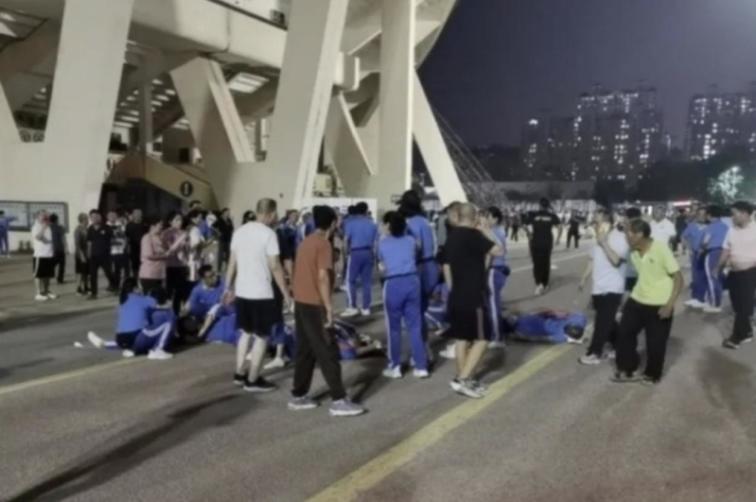Du Wen (YouTube video screenshot)
[People News] Recent revelations highlight severe issues within China’s prison system. Former Inner Mongolia official Du Wen recently disclosed exclusive information, citing an internal document from the Inner Mongolia Prison Administration. The document reveals that from January to September 2024, 45 inmates died in the region’s prisons. This alarming statistic underscores systemic mismanagement, inadequate medical resources, and the harsh realities of corruption and institutionalized human rights abuses within China’s judicial system. Du Wen shared real cases to expose the hidden crises in China’s prisons and their profound impact on social governance and international human rights.
Alarming Death Rates: Tip of the Iceberg?
The document from the Inner Mongolia Prison Administration notes: "This year, 45 inmates have died in custody, with a mortality rate of 0.14%, placing the region among the highest in mortality rates within China’s prison system." According to public data from the Ministry of Justice, there are 681 prisons in China, housing approximately 1.94 million inmates. Based on Inner Mongolia’s mortality rate, an estimated 2,716 inmates may have died nationwide in nine months.
To understand the severity of these figures, they can be compared with those of other countries:
United States: The 2022 report from the U.S. Federal Bureau of Prisons indicates a mortality rate of 0.03%, significantly lower than China’s.
United Kingdom: In 2019, the UK prison system reported a death rate of 0.01%, primarily from natural causes or suicides.
China: If the 0.14% mortality rate persists, over 3,600 inmates could die in custody annually, highlighting a crisis-level breakdown in prison management and medical care.
While the figures from Inner Mongolia represent only a fraction, they reflect systemic issues plaguing prisons nationwide.
Overcrowding and Collapsing Healthcare Systems
A common issue in China’s prison system is severe overcrowding. For example, in Inner Mongolia, the 19 prisons in the region have an average designed capacity of around 1,500 inmates, but the actual number of inmates typically exceeds this by 30% to 60%. For instance:
Hohhot Prison No. 3: Designed for 1,500 inmates but houses 2,300–2,400.
Hohhot Prison No. 4: Designed for 800 inmates but holds over 2,300.
Overcrowding strains resources such as medical care, food, and sanitation, exacerbating health problems among inmates.
Systemic Lack of Medical Resources
Medical care in prisons is critically inadequate. The document urges: "Legally increase the rate of medical parole for sick inmates to effectively reduce the in-custody mortality rate."
However, in practice, medical parole is almost nonexistent. Du Wen revealed: "Prison hospitals frequently lack essential medications, with funds diverted for absurd purchases like banlangen (an herbal remedy) to treat COVID-19."
Many severely ill inmates are denied medical parole and die from treatable conditions.
For instance, the Case of Jia Zhiyi: Suffering from a severe heart condition, Jia needed urgent treatment for a heart attack. His transfer request was denied due to restrictions during CCP anniversary celebrations. Jia died on the prison floor without even basic thrombolytic treatment. Shockingly, prison officials expressed indifference, remarking, "One less inmate, less trouble for us."
Corruption in Medical Care and Parole Systems
Du Wen detailed rampant corruption: "In my two years and nine months in prison, I witnessed 44 inmates secure medical parole through bribery. Four were granted emergency parole, while 40 paid bribes ranging from 90,000 to 3 million yuan." In contrast, those unable to pay bribes succumbed to their illnesses.
Case of Xu Guoqing: Convicted of bribery and suffering from rectal cancer, Xu’s condition wasn’t critical, but his family couldn’t afford the bribe. Xu died in agony, cursing the CCP and prison staff until his last breath.
Corruption extends to the Inner Mongolia judicial system, where four directors of the justice department, two prison chiefs, and two political commissars have been convicted of bribery. Even the prison hospital staff responsible for medical parole reviews were implicated.
This corruption not only deprives sick inmates of their basic rights but also further exacerbates the chaos in the prison system and the rising mortality rates.
A Challenge to International Human Rights
As a signatory to the UN Standard Minimum Rules for the Treatment of Prisoners (Mandela Rules), China is obligated to ensure basic health and dignity for inmates. Yet, the reality paints a grim picture. "Inmates in Chinese prisons are treated like abandoned livestock, denied basic medical care and humane treatment," Du Wen said.
He labeled these deaths as "institutionalized murders," akin to crimes against humanity or genocide under international law, holding Xi Jinping and CCP leadership accountable.
Du Wen called on global human rights organizations and individuals to scrutinize the death toll in Chinese prisons and pressure the CCP to implement reforms. He emphasized that behind each statistic lies a life and a grieving family, calling the situation "a large-scale human rights disaster."
The various problems within the prison system are, in fact, a microcosm of China’s broader governance crisis. In recent years, local governments have faced severe financial difficulties, leading to a decline in the quality of public services such as healthcare and education. At the same time, corruption within the judicial system has further deepened social inequality.
"From prisons to society, China’s systemic issues are on the brink of collapse. Prisons are supposed to be places for reforming the human spirit, but they have now become graveyards for humanity and life," he said.
The mortality problem in China’s prison system is not only a human rights tragedy but also a warning bell for social governance disorder. From Xu Guoqing’s agonizing death from cancer to Jia Zhiyi’s helpless demise from a heart attack, these bloody realities reveal the cold, harsh truth lurking behind the system.
(Reported by Xiao Ran for Kan Zhong Guo)










News magazine bootstrap themes!
I like this themes, fast loading and look profesional
Thank you Carlos!
You're welcome!
Please support me with give positive rating!
Yes Sure!